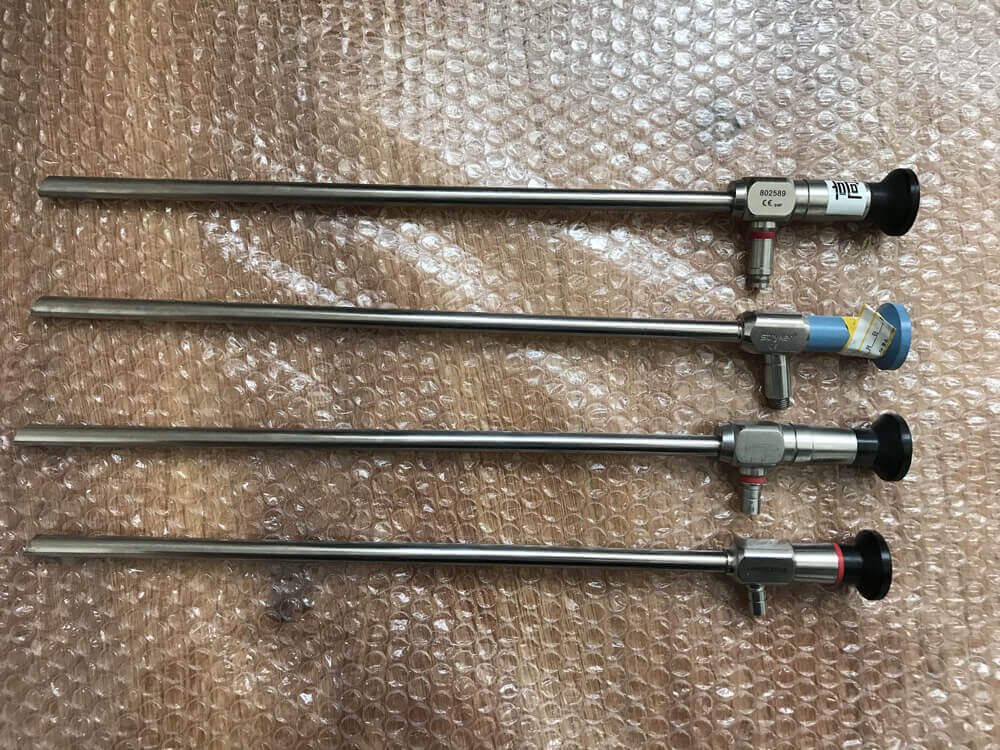硬管內(nèi)窺鏡的維護(hù)使用中的注意事項(xiàng)
Notes on maintenance and use of hard tube endoscope
硬管內(nèi)窺鏡在手術(shù)過程中受到損壞的現(xiàn)象并不多�����,雖然會(huì)與人體的組織如肌肉���、黏膜、骨骼等有接觸和磕碰�����,但是這些磕碰是輕微的�,不會(huì)造成窺鏡的損壞,因?yàn)樗皇瞧鹩^察的作用���,不是其他器械的受力點(diǎn)���。但是在使用其他器械時(shí),尤其是咬合力較大的鉗�、剪類器械應(yīng)注意鏡管的前端不要伸進(jìn)器械的咬合區(qū)內(nèi),以免誤傷鏡管����。在使用這類器械時(shí),有時(shí)醫(yī)生為了看清楚咬合區(qū)的組織���,把窺鏡伸得很靠近組織�����,器械咬合時(shí)窺鏡沒有退回��,誤傷了窺鏡��。手術(shù)時(shí)如注意讓器械的咬合口全部都在窺鏡的觀察范圍內(nèi)就可以避免此類事故發(fā)生���。
There are not many cases of damage to the hard tube endoscope during the operation. Although it may contact and bump with human tissues such as muscles, mucosa and bones, these bumps are slight and will not cause damage to the endoscope, because it is only used for observation, not the force bearing point of other instruments. However, when using other instruments, especially forceps and scissors with large bite force, the front end of the lens tube should not extend into the occlusal area of the instrument, so as to avoid accidental injury to the lens tube. When using this kind of instrument, sometimes the doctor extends the endoscope very close to the tissue in order to see clearly the tissue in the occlusal area. When the instrument is occluded, the endoscope does not return and the endoscope is injured by mistake. This kind of accident can be avoided if the occlusal mouth of the instrument is all within the scope of the endoscope.

有些手術(shù)窺鏡是在鞘管內(nèi)使用��,在更換其他角度窺鏡或插拔器械時(shí)�����,應(yīng)注意動(dòng)作要輕����,不可用力過猛���。尤其是插拔窺鏡過程中�,當(dāng)遇到阻力拔不動(dòng)時(shí)應(yīng)仔細(xì)查找原因����,必要時(shí)應(yīng)連同鞘管一起拔取�,不要用蠻力����。
Some operating endoscopes are used in the sheath tube. When replacing the endoscope with other angles or inserting and pulling out the instrument, the action should be light and the force should not be too strong. Especially in the process of inserting and pulling out the endoscope, when the resistance is encountered, the reason should be carefully found out. If necessary, it should be pulled out together with the sheath tube, without brute force.
當(dāng)窺鏡配合激光汽化����、高頻電切、微波等光電技術(shù)進(jìn)行手術(shù)時(shí)���,應(yīng)注意窺鏡前端與治療點(diǎn)的距離�,保證窺鏡前端不被電擊或燒灼���。首次使用這些器械時(shí)����,主刀醫(yī)生應(yīng)反復(fù)練習(xí)�����,掌握窺鏡圖像中物距和實(shí)際物距的關(guān)系����,確認(rèn)窺鏡前端與治療點(diǎn)的最近距離�����,以便在實(shí)際手術(shù)中應(yīng)用自如����。
When the endoscope is operated with laser vaporization, high-frequency electrosurgical excision, microwave and other photoelectric technologies, attention should be paid to the distance between the front end of the endoscope and the treatment point to ensure that the front end of the endoscope is not shocked or burned. When using these instruments for the first time, the chief surgeon should practice repeatedly to master the relationship between the object distance in the endoscope image and the actual object distance, and confirm the nearest distance between the front end of the endoscope and the treatment point, so that it can be used freely in the actual operation.
目前在耳鼻喉科�����、骨科的臨床手術(shù)中已經(jīng)廣泛使用刨削器來切除病變組織�����。其刀頭鋒利�����、硬度高����、旋轉(zhuǎn)速度快、力矩大�,如果削到內(nèi)窺鏡�����,窺鏡必?fù)p無疑����。在此類手術(shù)中要注意調(diào)整沖洗和吸引的速度�����,隨時(shí)保證窺鏡圖像清晰不被血污遮擋����,控制刀頭的旋轉(zhuǎn)部分始終在窺鏡的觀察范圍內(nèi)����,在手術(shù)范圍較大時(shí),應(yīng)先停止刀頭轉(zhuǎn)動(dòng)����,再移動(dòng)窺鏡,然后在窺鏡監(jiān)視下移動(dòng)刀頭��,到合適部位后再開機(jī)刨削�����。當(dāng)感覺到刨刀工作異常或照度突然降低時(shí)���,有可能窺鏡已經(jīng)受損�,應(yīng)及時(shí)更換����,以免造成更大損失。
At present, the planer has been widely used in otolaryngology and orthopedics to remove the pathological tissue. The cutter head is sharp, high hardness, fast rotation speed and large torque. If it is cut to the endoscope, the endoscope will be damaged. In this kind of operation, attention should be paid to adjusting the speed of washing and suction to ensure that the endoscope image is clear at any time, and the rotating part of the knife head is always within the scope of observation of the endoscope. When the operation range is large, the rotation of the knife head should be stopped first, then the endoscope should be moved, and then the knife head should be moved under the monitoring of the endoscope, and then the machine should be started to planing after reaching the appropriate position. When the planer blade works abnormally or the illumination suddenly decreases, the endoscope may have been damaged, so it should be replaced in time to avoid greater loss.
一般重要手術(shù)��,應(yīng)有一套備用窺鏡和關(guān)鍵器械���,在發(fā)現(xiàn)問題時(shí)可以從容地更換����;如果使用角度不合適的窺鏡或不配套的器械勉強(qiáng)手術(shù)��,也容易造成窺鏡的損壞�。
For general important surgery, there should be a set of spare endoscopes and key instruments, which can be easily replaced when problems are found; if the endoscope with inappropriate angle or incompatible equipment is used to force the operation, it is easy to cause damage to the endoscope.



 公司:匠仁醫(yī)療設(shè)備有限公司
公司:匠仁醫(yī)療設(shè)備有限公司